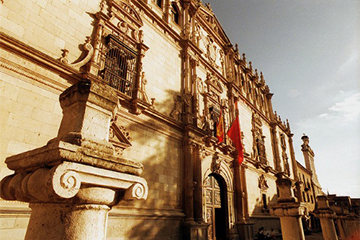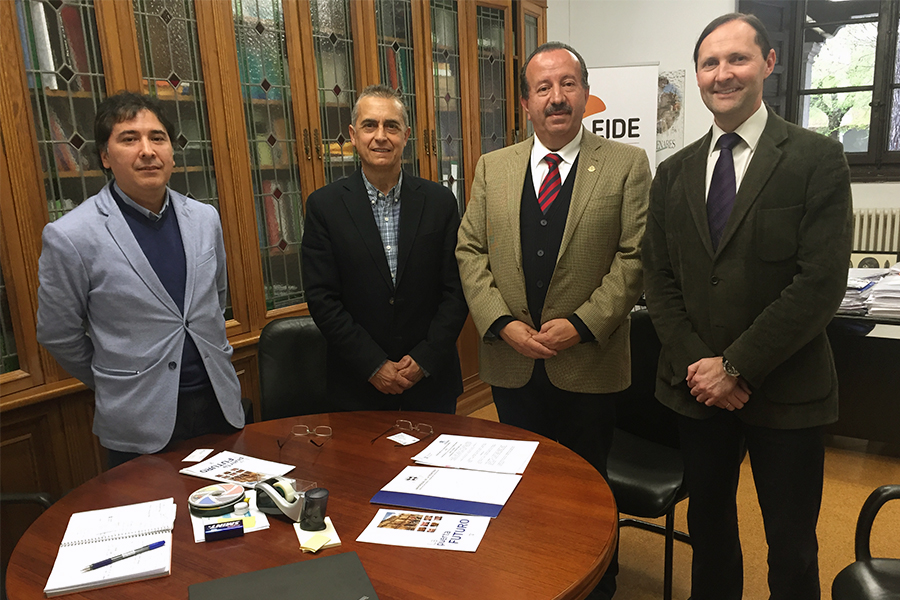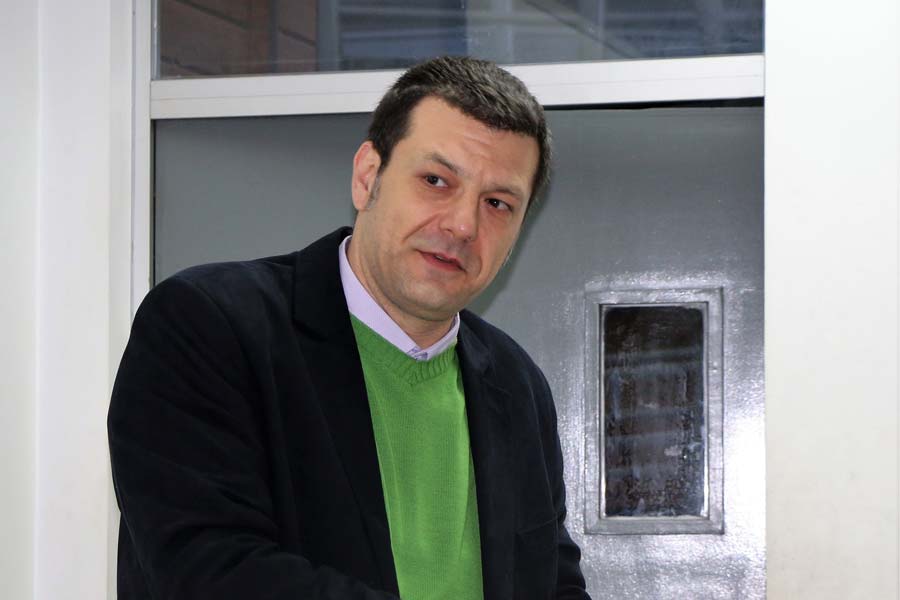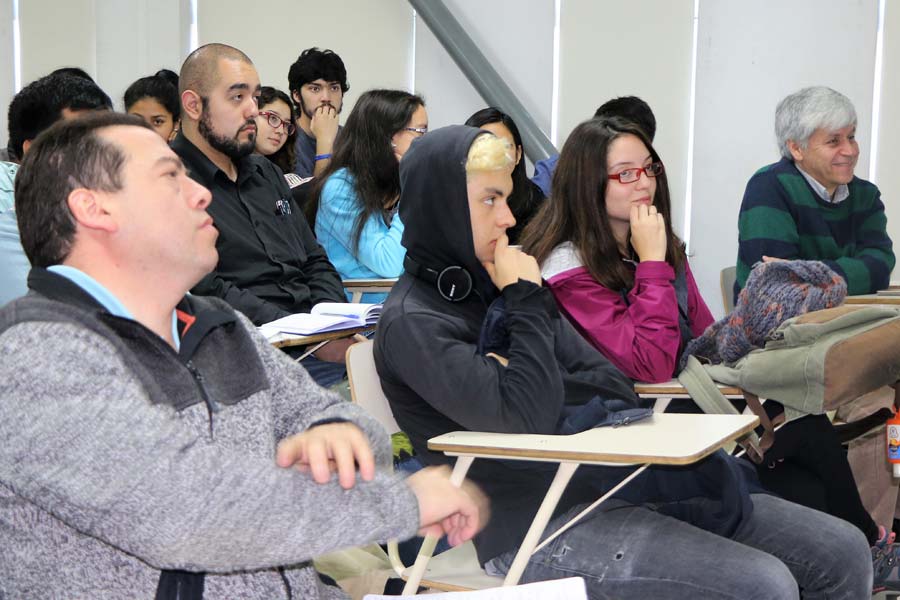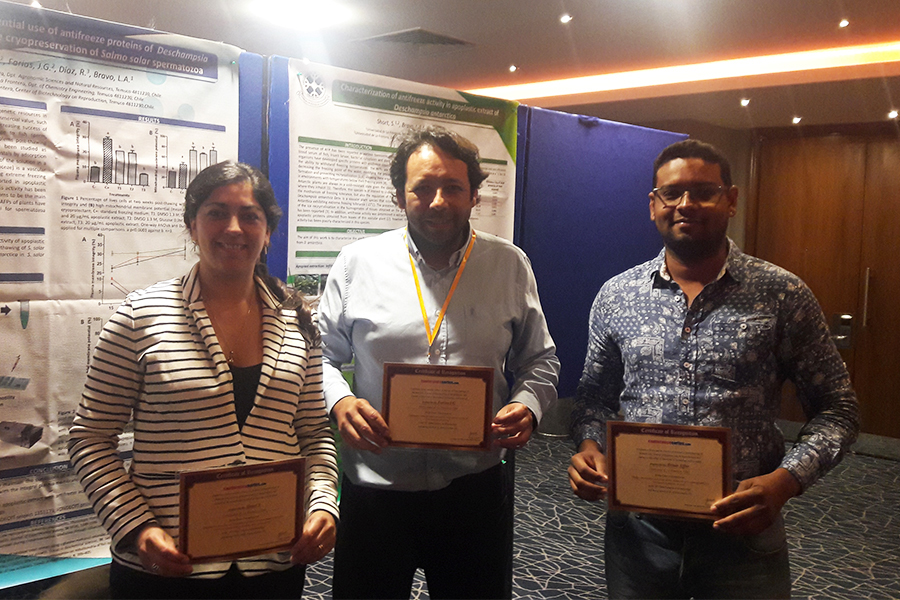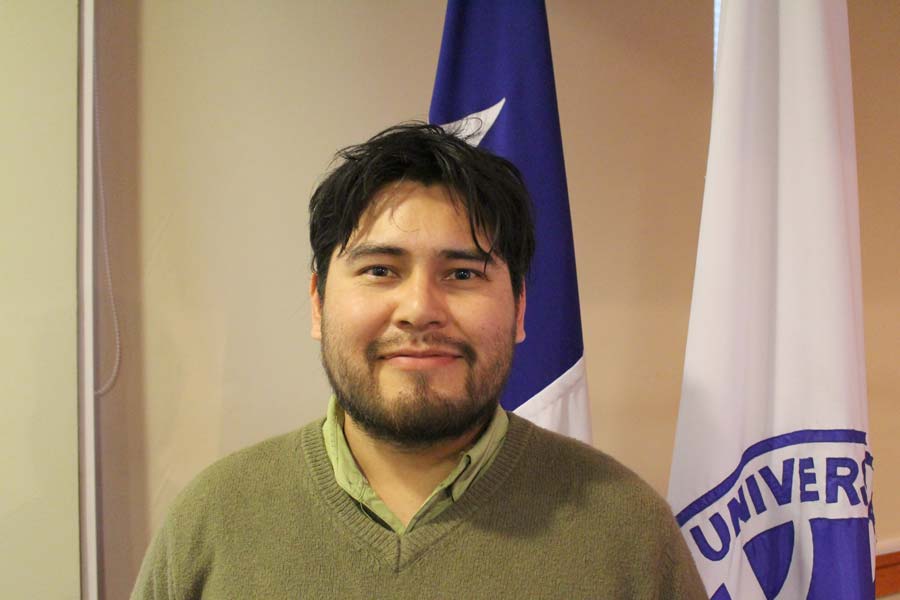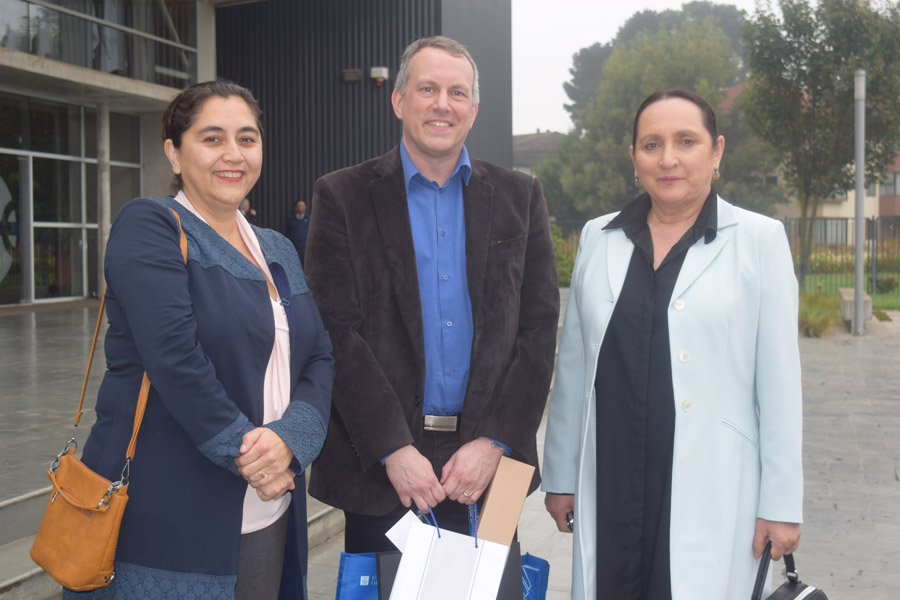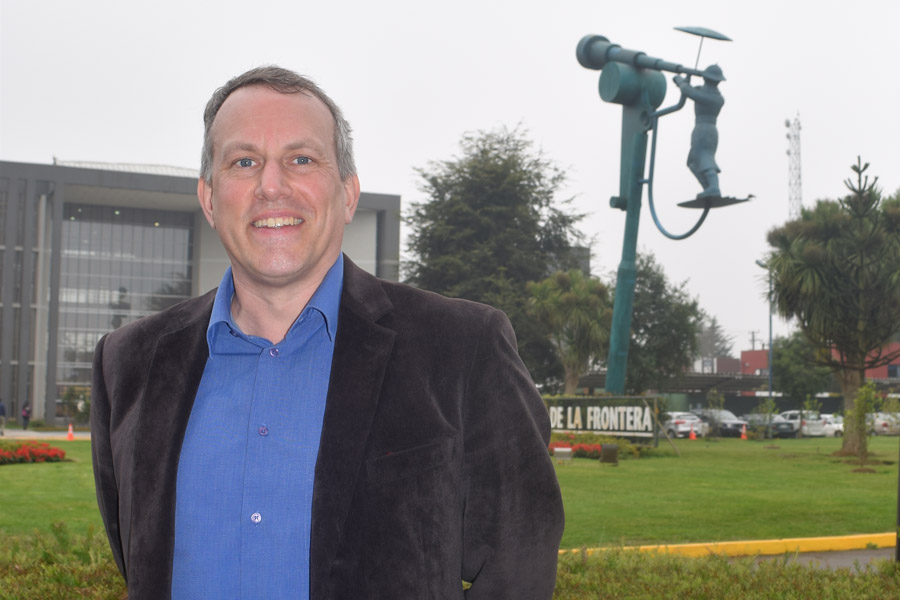|
The joint work since 2010 has been formalized by this Agreement that made academic collaboration possible and offers new opportunities of linkage. |
The Universidad de Alcalá (UAH) in Spain is among the best higher education institutions in Spain and the most ancient ones in Europe. It also is the most current partner of the Universidad de La Frontera, after the signing of a Collaboration Agreement. The Agreement is a formalization of joint work that dates back to 2010 and that has created the possibility of academic collaboration. It has been signed by the Vice-rector of International Affairs, Miguel Angel Sotelo, of the UAH, in the presence of the Dean and the Vice-dean of the Faculty of Agricultural and Forestry Science of the UFRO, Rodolfo Pihán and Adison Altamirano. The signing of the Agreement was one of a series of activities at that university in order to boost new actions of cooperation. “This is an important Agreement, since it is the formalization of joint work that is ongoing since more than five years, with permanent exchange of academic staff, research, projects and publications, and also at the postgraduate level. Now, new international cooperation possibilities open up with a university of prestige and tradition and which is one of the best and most ancient ones in Spain”, the dean Rodolfo Pihán stated. The UFRO director of International Affairs, Dr. Pamela Leal, appreciates this Agreement that contributes to “the internationalization of our University by strengthening joint collaboration and opens new opportunities for teacher and student mobility. It also creates the possibility to increase the productivity in publications and in the access to international funds for research. Apart from that, it also strengthens our networks with Spain, through the AUIP (Iberoamerican University Association for Postgraduate Studies), which both institutions are part of.” MORE INTERNATIONAL LINKS On the basis of this Agreement, the expectation is to promote new joint actions oriented towards joint research, the professional training, teacher and student mobility, and others. The link with the UAH has been made mainly through the Faculty of Agricultural and Forestry Science of the UFRO, and the academic relation with one of the most renowned professors in Spain, Dr. José María Rey Banayas, who also is one of the creators of the International Foundation for Ecosystem Restoration (FIRE). “One of the driving forces of this alliance is Dr. Rey Benayas with whom we were working on a MEC Project of the National Fund for Scientific and Technological Development (FONDECYT), in which we materialized a series of teaching, research and outreach and community engagement activities. Apart from that, we have a student of the Master in Natural Resource Management who went to Spain for his studies. This Agreement opens doors in the collaboration with other fields of the UFRO that can join us, especially through academic exchange and cotutelle doctorates, which they are very interested in”, Dr. Adison Altamirano, who is one of the promoters of this Agreement, specified.
Written by: Jassna Sepúlveda Beltrán
Communications Division |
|
The professor of philosophy, ethics and logic at the University of South Bohemia in the Czech Republic visited the UFRO School of Education and met with students of the programs Spanish and Communication Teaching and Mathematics Teaching in order to share his experience in civic education in Europe and the role of the professor in education. |
Within the framework of the Civic Education class, which is part of the new curriculum of the study programs in education of the Universidad de La Frontera, more than a hundred students of these programs participated in this activity. The professor Nenad Milicic was in charge of this activity which was called “Mission, vision and position of civic education in the scholar system in a democratic state, experience in Europe”. During the activity, the Serbian professor referred to the context of the topics related to the relevance of the training of citizens in Europe and explained the associated conceptualizations. He also talked about the experience Europe made during the introduction of these subjects into the educational system. Nenad Milicic pointed out that he is working on different projects that require international cooperation. This is why he is interested in consolidating his work with the Universidad de La Frontera, since it is very similar to the University of South Bohemia (Czech Republic), which he works for. This way, the professor´s visit led to an interaction between students and teachers and created a dialogue about the similarities and differences between the educational systems, in Europe as well as in America, and Chile in particular. It was an important contribution to the civic education of the students who participate in this class during this semester and an enriching debate that strengthens the topics that are contemplated in the annual planning. Written by: María Carolina Oyarzún
UFRO School of Education |
|
Dr. Jorge Farías and the students Stefania Short and Bryan Effer presented their research advances related to an international project for the production of a leukemia drug and the characterization of antifreeze activity in apoplastic extract of Deschampsia Antarctica. |
The motivation for the participation of the Doctoral Program in Science with specialization in Applied Cellular and Molecular Biology of the Universidad de La Frontera in this international event in London with presentations by Dr. Jorge Farías and the students Stefania Short and Bryan Effer was to share their scientific advances and create international links. It is also worth to mention that the resume of the presented studies have been published in the Journal of Biotechnology & Biomaterials. The studies are called:
 Written by: Dirección de Comunicaciones Written by: Dirección de ComunicacionesThis email address is being protected from spambots. You need JavaScript enabled to view it. |
|
Within a work alliance between the Chilean Universidad de Concepción (UDEC) and the UFRO, with the help of Dr. Rodrigo Abarca del Rio, the UFRO collaborates on this mission and provides the training of advanced human capital capable of analyzing the data provided by SWOT, information that will allow to assess the existing water resources in Chile at the basins level. |
The SWOT (Surface Water and Ocean Topography) mission is a space mission led by NASA (National Aeronautics and Space Administration) and the French CNES (National Center for Space Studies). Its objective is the better understanding of the world's oceans and its terrestrial surface waters. The mission will be launched in 2021.
 Written by: Daphne Bormann Written by: Daphne BormannFaculty of Engineering |
|
The Doctor in English Philology and director of the Program in English Philology at the University of Tampere, Mark Kaunisto, travelled from Finland to Temuco and met with authorities and professionals of the Universidad de La Frontera in order to give a new impetus to the agreement. |
The University of Tampere is located north of Helsinki in the city of Tampere and has more than eleven thousand undergraduate students, two thousand more than the Universidad de La Frontera. Both higher education establishments signed a Cooperation Agreement, five years ago, which stipulates the exchange of Finnish teachers who come to our University to teach and strengthen the English skills of our undergraduate students, while they get to know the local culture and learn Spanish. In order to give a new impetus to this agreement, the Doctor in English Philology and director of the Program in English Philology at the University of Tampere, Mark Kaunisto, travelled from Finland to Temuco. He met with UFRO authorities and professionals to address the specific agreement that, in August 2018, will bring two English teachers of the University or Tampere to the UFRO for the first time. They will be collaborating at the Language Coordination Center (CODI) for undergraduate students and in the English Teaching Program. At the same time, Dr. Mark Kaunisto expressed his satisfaction with how the English program is developed for all UFRO study Programs. “In recent times, we have been contacted by universities from different parts of the world and that created trust regarding the result of our work, and the interest in supporting the Universidad de La Frontera came up because it is part of our institutional policy to share the results of our experience with the rest of the world”, he explained. “I was anxious to see how the English language is taught here and, in this context, I was impressed when I saw the classroom equipment and also the space and big local development of the educational material the Language Coordination Center works with, such as the platform and educational videos for English teaching. They involve methodologies in the context of real life for the students in this country”, Kaunisto pointed out. THE FINNISH SECRET Finland is a country with a very good reputation worldwide, for its education but also for its quality of life. In addition, according to the Annual World Happiness Report of 2018, an initiative of the UN, the Nordic country is the happiest in the world. Apart from that, its population of more than five million people is at least trilingual, since Finnish and Swedish are the native languages and the English language is learnt from a young age. The academic staff member of the UFRO Department of Language, Literature and Communication and coordinator of the Minor in English, Lilian Gonzalez, expressed her concern about the poor command of English in the country and emphasized the importance of this agreement between both universities. “The level of English has to be significantly improved. In Finland, a person who finishes secondary education is trilingual, with Finnish, Swedish and English. Therefore, their standards are very high. At the same time, the University of Tampere showed its interest and is open to this concept, because several of its teachers have come to our University to work with us, with excellent results and a good evaluation by the students.” How do they teach English in Finland? And why do they have such a good language command? These were the questions Dr. Mark Kaunisto has been asked and he explained that they do intensive teaching starting in elementary education. “Finnish and Swedish are the official languages and English is a foreign language we start teaching intensively in elementary education. One of the main motivations the kids have for learning English is that the media uses this language and it is not translated. For example the shows on television do not have subtitles and therefore it is normal for children to see and hear the programs in English. This way, they also train their sense of hearing and that is an important support for their progress at school.” “And since this immersion in the English language happens in such a natural way, it facilitates the learning process of other languages, such as Spanish, German or French. It is like sports: if you already play soccer, it is easier to learn how to play basketball or tennis. The second language is difficult to learn, but the next ones are easier, since your brain is already trained and flexible, and also your attitude”, Kaunisto assured.
|





